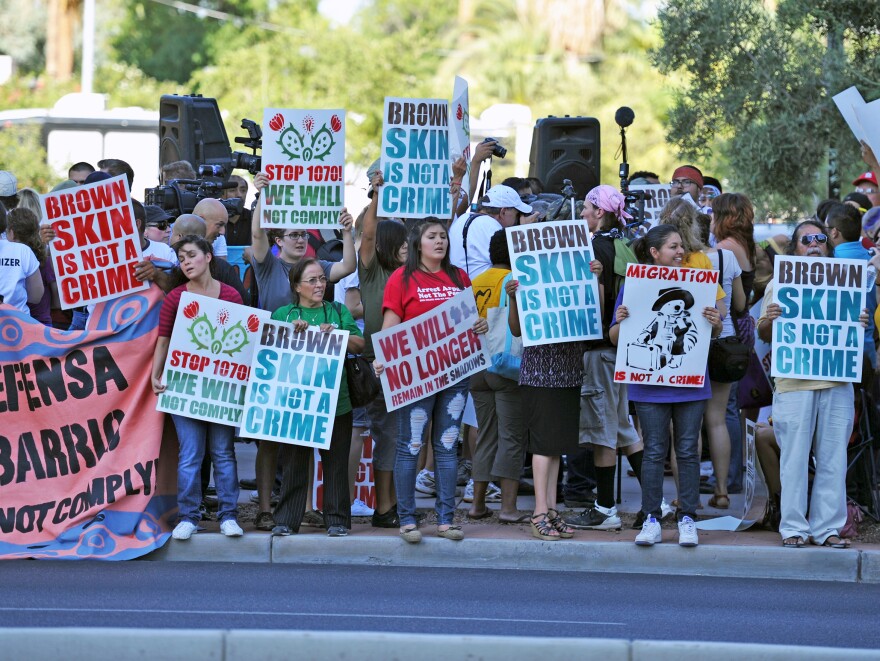As Arizona officials prepare to apply the one provision of the state's immigration law upheld by the U.S. Supreme Court, some local authorities doubt they can properly enforce it.
"We will do our best to enforce the law. But we are in uncharted territory on this issue," Tucson Police Chief Roberto Villasenor said in a statement released by the Police Executive Research Forum, a nonprofit organization of police chiefs. The group says the law "will seriously undermine local law enforcement."

The court's 5-3 decision struck down three key provisions of the law, but the justices unanimously sustained the most controversial part, which requires police to verify the immigration status of anyone stopped for a crime if police have a "reasonable suspicion" that the person might be in the country illegally.
Potential Legal Challenges
Many law enforcement authorities say the law doesn't clearly define "reasonable suspicion," potentially exposing police to lawsuits alleging misconduct such as racial profiling.
The Justice Department, which sued to block the Arizona law, has set up a telephone hotline and email for the public to report potential civil rights violations as the state enacts the so-called "show me your papers" provision.
Maricopa County Sheriff Joe Arpaio, who has become a national lightning rod for aggressively enforcing the law, has said he expects the court ruling to foment criticism that he and other agencies continue to racially profile suspected illegal immigrants.
The Justice Department has filed a lawsuit accusing Arpaio's department of racially profiling Latinos. Arpaio denies the claim. He told NPR's Ted Robbins that he's "happy" about the ruling because it "just confirms or affirms what we've been doing anyway."
Pima County Sheriff Clarence Dupnik, who opposes the law and has refused to enforce it, told NPR that the ruling is "not going to change the way we've operated." Dupnik's territory covers Tucson and much of southern Arizona.
Weakened Arrest Powers
The court threw out the portions of the Arizona law that would charge people with a misdemeanor for failing to carry immigration documents; criminalize the act of an illegal immigrant applying for a job; and authorize officers to arrest people believed to have committed a crime that makes them eligible for deportation.
Despite their weakened arrest powers, police will be required to contact federal Immigration and Customs Enforcement agents to determine the immigration status of people they stop if officers suspect that they are in the country illegally.
The law also says police will check immigration status if it's practical to do so. But authorities say they have no clarity about the factors that establish such circumstances.
Police also could face legal challenges from supporters of the law, through language that allows people to sue police for failing to enforce "show me your papers."
"We're going to see lawsuits on both sides of this," says Chuck Wexler, executive director of the Police Executive Research Forum.

And, Wexler says, police checks of immigration status will damage relationships between officers and illegal immigrants, who will be "less likely to report crimes, to serve as witnesses."
Arizona's Governor Stands Firm
Arizona Gov. Jan Brewer, a Republican who signed the bill into law in 2010, defended the ruling as a reinforcement of "Arizona's and every other state's inherent authority to protect and defend its people." Brewer has said the law won't lead to racial profiling.
But, ultimately, the effectiveness of the law could depend on whether ICE agents cooperate with local police in helping to verify people's status.
It appears that cooperation could be scaled back: The Obama administration has announced that it was revoking so-called 287(g) agreements with Arizona police agencies that authorized local officers to act as immigration agents.
In addition, the Department of Homeland Security has restated its priority of deporting criminals and halting action against otherwise law-abiding young people.
Charles Foster, a prominent Houston immigration lawyer and former adviser to President George W. Bush and then to Obama's 2008 presidential campaign, says he believes federal officials are sending a clear message to Arizona that they won't aggressively pursue "show your papers" violations.
Criminals "are the ones they want to arrest and place in deportation procedures," says Foster, who filed a friend-of-the-court brief supporting the Justice Department's challenge of the Arizona law.
Copyright 2021 NPR. To see more, visit https://www.npr.org.



